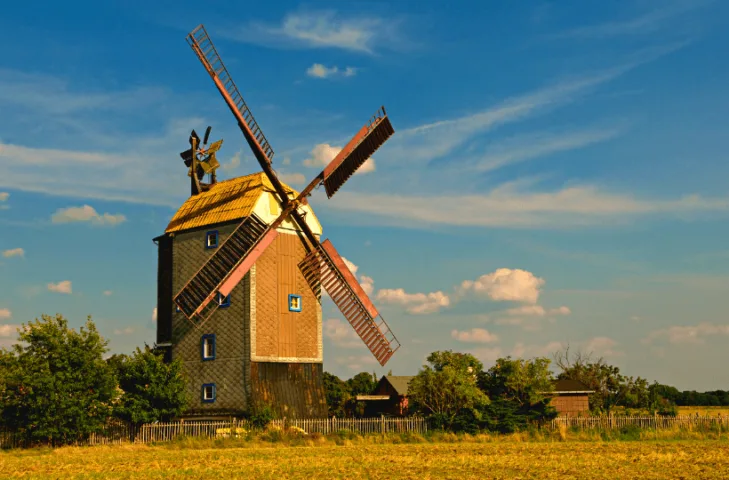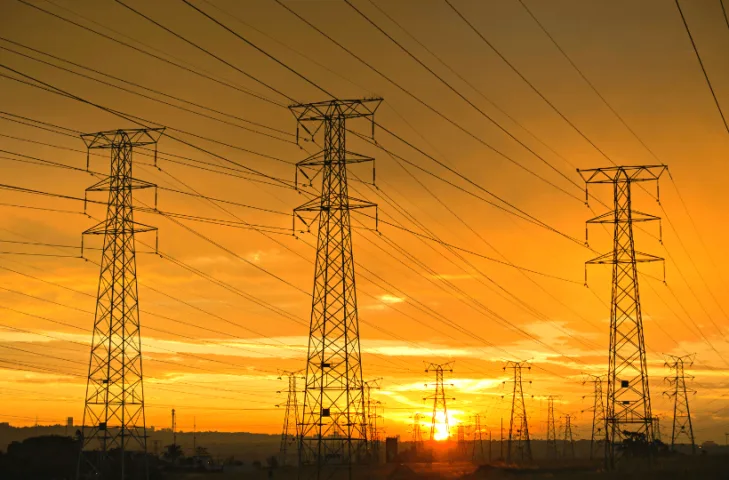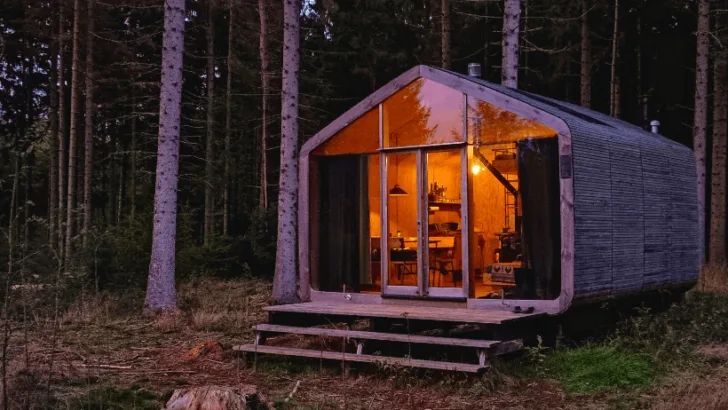Off-grid energy systems are becoming more popular every year. Reasons for this include concerns about climate change, the need to lessen our dependency on fossil fuels, wanting to be self-reliant, and more.
With this growing interest and popularity comes more questions than ever about the efficiency of off-grid systems, their cost-effectiveness, and if they actually are “better” for the planet.
How does an off-grid energy system differ from a conventional grid-connected system? What is necessary to build an off-grid system? Does solar power have to be off-grid or can it still be connected?
Keep reading to find out the answers to all of these questions and more! This off-grid vs on-grid guide is perfect for anyone, but especially beginners, wanting to learn more about power supply at home and for those considering an off-grid lifestyle.
Check out some of our other homesteading articles:
– 10 Ways To Start Homesteading Before You Have A Homestead
– Financing An Off-Grid Property With A Land Loan
What Does Off-Grid Mean?
Off-grid refers to a system or location that is not connected to the main electrical grid. This suggests that the system or location generates its own electricity with alternative sources like solar panels, wind turbines, or generators.
Off-grid can also refer to a location that is not connected to any other public utilities such as water, sewer, or gas. However, the primary use of this term refers to electricity supply, and that is what we will focus on in this post.
Numerous factors influence why people prefer to live off-grid. Some people chose this way of life in order to live more sustainably and with less of an impact on the environment. Others are driven by a desire for greater independence from conventional systems and self-sufficiency.
How Off-Grid Systems Work
Most people hear “off-grid” and immediately associate that with solar power being used as the main source of electricity. While this is certainly common, it is not always the case.
There are many other ways to generate electricity in place of being connected to the grid. Some other sources of energy (besides solar) include wind, hydro (water), and gas or diesel generators.
An off-grid electrical system typically includes a combination of components such as batteries, generators, and inverters that work together to provide electricity to a home or building.
- Battery bank: This is a collection of batteries that are linked together to store electricity. They serve as power sources when the sun is not shining or the wind is not blowing by storing the energy produced by solar or wind turbines.
- Generator: A generator is a device that converts mechanical energy into electrical energy. It can be powered by gasoline, diesel, propane, or natural gas. It can be used as a backup power source or to charge the battery bank when necessary.
- Inverter: An inverter is a device that converts the direct current (DC) power stored in the battery bank into alternating current (AC) power, which is the type of power used in most homes and buildings.
- Charge controller: A charge controller is a device that regulates the amount of electrical current flowing into the battery bank. It prevents the batteries from overcharging and prolongs their life.
- Solar panels/wind turbine: Solar panels or wind turbines can be used to generate electrical energy, either during the day or when the wind is blowing.
- The system also includes wiring, breakers, and other safety devices to ensure that the electrical system is safe and reliable.

Benefits of Off-Grid Living
There are many benefits to living off-grid! We will go over the most common benefits here, but if you have other reasons for living off-grid, please make a comment on this post and I may add it to this article.
Self-Reliance
Living in an off-grid home eliminates your dependence on public utilities for electricity. It is also less susceptible to power outages brought on by natural disasters like storms and floods, which can damage conventional power lines and cause power outages. Additionally, you won’t be as impacted by energy company price increases.
Being less reliant on outside resources for your basic needs will give you a sense of empowerment and self-sufficiency!
Better for the Environment
Living off the grid is generally considered to be better for the environment for several reasons.
Homes that are off the grid rely on renewable energy sources, such as solar and wind power, which do not (directly) produce emissions or pollution. This helps to reduce the carbon footprint of the home, and the dependence on fossil fuels that contribute to air and water pollution.
Secondly, off-grid homes often rely on their own water wells and sewage systems, which helps to reduce the use of treated water and sewage that are a burden on the environment.
Lastly, living off-grid can also promote sustainable living practices, such as growing your own food, composting, and reducing consumption. This last point is especially important.
If you set up an off-grid home with all the modern conveniences/appliances of a regular home, you are still consuming the same amount of resources, therefore nullifying the benefits of any clean energy. The only way to truly reduce your impact on the environment is to CONSUME SIGNIFICANTLY LESS. That’s it.
**It is important to note that although both solar and wind power do not actively produce carbon emissions while in use, there are incidental byproducts that are considered waste and pollution. The production and transportation of solar panels and wind turbines require the use of processes that disturb the earth and machinery that operate on fossil fuels.
Additionally, off-grid setups need batteries to function efficiently. These batteries and solar panels need to be replaced at regular intervals which contributes to the waste stream.**
Privacy and Seclusion
One of my favorite reasons to pursue an off-grid lifestyle is the ability to live anywhere. And that means anywhere, with no caveats. You could move to the top of a mountain, an island, the middle of the desert, or the unorganized lands of the Yukon in Canada.
Nowhere is off-limits when you don’t need to be in proximity to a road, town, or anything else specific!
When you have the option to choose where you live, you can also choose the level of privacy and seclusion your home has. Hate neighbors? Buy land with none. Hate roads? Buy a place far away from any.
Additionally, since you are not connected to any public utilities, no maintenance will need to be done by utility workers or other service providers. You have full discretion over who has access to your property, and that is a luxury that is hard to overstate.
Living in a remote area can naturally provide a sense of seclusion and isolation from the hustle and bustle of urban or suburban life.

What Does On-Grid Mean?
The term “on-grid living” describes a situation in which a home or other structure is linked to the utility grid, the system for transferring and distributing electrical electricity. When a building is on the grid, it receives electricity from the utility company and has the option of sending any extra electricity it produces on its own (through solar panels, for instance) back to the grid.
The home is connected to the utility grid, providing a dependable electricity source that may be used as needed. Under a net metering system, if a household produces more electricity than it consumes, the surplus will be transferred back to the grid and the homeowner will receive a credit on their utility bill.
On-grid living is the most common type of living as it is the most convenient and easy to maintain, the homeowner does not need to worry about the complexities of maintaining an off-grid system.
How On-Grid Systems Work
A typical on-grid system is set up to provide utilities such as electricity, natural gas, and water to a house. The basic components of an on-grid system include:
- Utility lines: These are the lines that connect the house to the utility grid. The lines for electricity, natural gas, and water are typically separate, but they may be connected to the same pole or underground.
- Electric meter: This is the device that measures the amount of electricity used by the house. It is typically located on the outside of the house, near the point where the utility lines connect to the house.
- Service panel: This is the main electrical distribution point for the house. It is typically located in the garage or basement, and it is where the main electrical line coming from the utility company connects to the house.
- Main shutoff valves: These are typically located near the service panel and allow for the utilities to be shut off to the entire house in case of emergency or maintenance.
Once the installation is complete, the homeowner would be responsible for paying for the utilities they use, as measured by the electric meter, gas meter, and water meter.
The homeowner may also have the option to install renewable energy sources such as solar panels or wind turbines, which can reduce the amount of electricity they need to purchase from the utility company, but they will still be connected to the grid.
Benefits of On-Grid Living
Convenience
Of course, convenience is number one. Most houses for sale are already connected to the grid, which means instant access to electricity as soon as you move in. Maintenance of the lines is the responsibility of the utility company, not the homeowners.
Even during power outages, which are admittedly inconvenient, at least it is not the consumers’ job to find the problem in the system and fix it. You can wait in the comfort of your own home while someone else goes into a storm or dangerous situation to fix the outage.
Cost
It is usually less expensive to buy a house already connected to the grid than set up your own off-grid electrical system.
Additionally, if you live in the vicinity of already established power lines, but do not have electrical service, it could also be less expensive to have power brought to your house than to build an off-grid system.
The only time it will definitely cost more to go on-grid instead of off-grid is if you live miles from the nearest power line. You will be responsible for the cost the utility line incurs to set up power to your property, which if it’s far, could be 10s of thousands of dollars.
Can Sell Excess Electricity
With grid-tied solar panels or wind turbines, homeowners can sell excess electricity they generate back to the grid, which can offset the cost of their own electricity consumption. We will be publishing an article explaining the ins and outs of this and net-metering systems soon, so make sure to look for that!

Comparison Summary: Off-Grid vs. On-Grid
So, which system is best for you? That depends on your individual needs and preferences. Below are some factors to consider when deciding between off-grid and on-grid living:
- Cost: Off-grid living can have a higher upfront cost, as it involves the initial investment in renewable energy systems and storage batteries. However, off-grid living can also lead to long-term cost savings, as you are not paying a monthly utility bill.
- Maintenance: Off-grid systems require regular maintenance to ensure that they function properly and efficiently. This can include cleaning and repairing solar panels, replacing batteries, and checking that all equipment is in working order. One pro of this though is that you’re never waiting on someone else (utility company) to come fix or maintain your power supply.
On-grid systems require less maintenance, as the utility company is responsible for maintaining the power grid. - Environmental impact: Off-grid living can be more environmentally friendly, as it reduces reliance on fossil fuels and the greenhouse gas emissions they produce.
The most important thing to note about being “greener” is that whether you are connected to the grid or not, using power is still consumption. Period. The best way to reduce your environmental impact is to reduce your consumption.
Conclusion
In conclusion, both off-grid and on-grid systems have their own advantages and disadvantages. Off-grid living provides independence and self-sufficiency but can have a higher upfront cost and require more maintenance. On-grid living is more convenient and often more cost-effective, but requires a monthly utility bill and relies on a central power source.
When deciding between the two, consider your individual needs and preferences, as well as the cost, maintenance, and environmental impact of each system.

